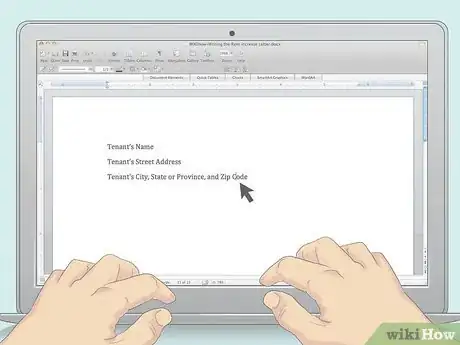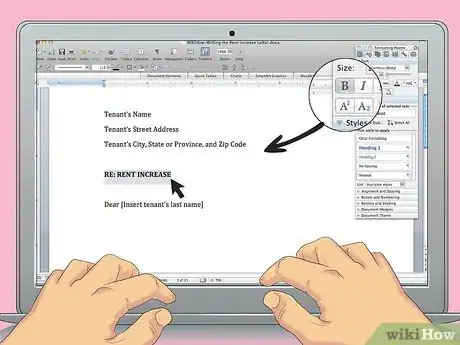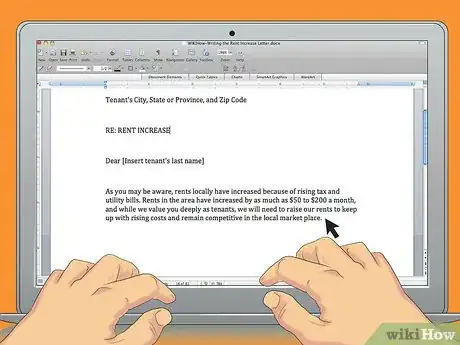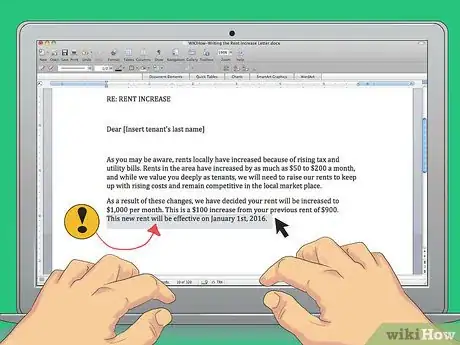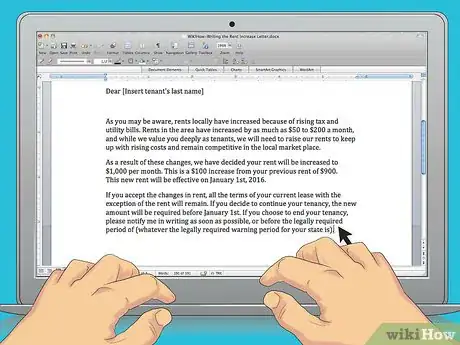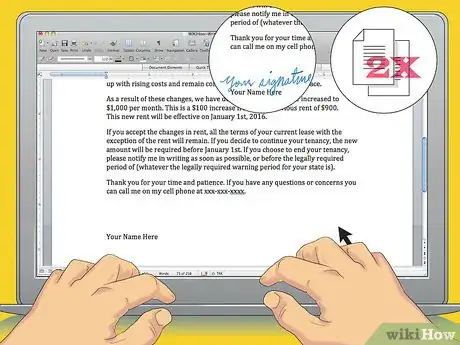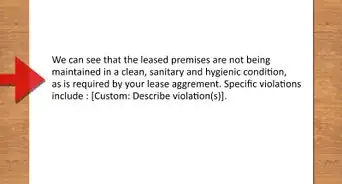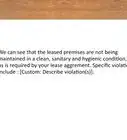X
This article was co-authored by Michael R. Lewis. Michael R. Lewis is a retired corporate executive, entrepreneur, and investment advisor in Texas. He has over 40 years of experience in business and finance, including as a Vice President for Blue Cross Blue Shield of Texas. He has a BBA in Industrial Management from the University of Texas at Austin.
This article has been viewed 65,972 times.
Raising rents is an unfortunate but necessary part of being a landlord. It is a requirement that a landlord notify a tenant of a rent increase in writing, and writing a clear, courteous, and legally binding rent increase letter is an essential skill for a landlord.
Steps
Part 1
Part 1 of 2:
Preparing to Write a Rate Increase Letter
-
1Know the law for your particular state or region. There are numerous factors in place that could determine when, if, and how much you can increase the rent on your tenant. Knowing these rules and regulations is essential to ensure you are acting legally.[1]
- If your tenant signed a lease, you cannot raise the rent until the lease term is up, unless the lease states that a rent increase is allowed.
- For month-to-month tenants, a rent increase can occur after the proper notice period, which is often 30 days, but varies state to state.
- There can be limitations as to how much you can raise rent, as well as how often depending upon the state laws where the property is located.
- Rent can never be raised as punishment for a tenant's bad behavior or as a form of discrimination. However, the lease may list specific behaviors that may lead to eviction, such as drug abuse, criminal conviction, failure to disclose certain info, and so on.
- To learn your particular state's laws, check the landlord & tenant laws for your state. If you have any questions, contact a lawyer or the landlord & tenant board or authority for your state.
-
2Understand your rights & responsibilities. It is important to know that you do not need to justify a rent increase to your tenant, or explain it in any way. While tenants may be upset, explaining your needs and financial situation is not a requirement.
- The rent increase must be legal. That is to say, you cannot increase it more than your state's landlord & tenant laws allow, you must provide proper warning, and you cannot raise the rent more often than your state allows (usually once a year).
- It is essential to notify your tenant in writing, and to keep a copy of the letter for yourself. This is in case of a dispute.
- Following good rent-increasing practices can reduce the risk of your tenant being upset or leaving.
- If your tenant decides to leave, you have the right to receive advance notice (typically 30 days) from them before they do so. Check your state landlord & tenant laws for confirmation
Advertisement -
3Use good rent-increase practices. A big fear of raising rent is that your tenant will leave, and this fear is not unreasonable. Fortunately, by taking a few simple steps you can greatly reduce the risk of your tenant being upset by a rent increase.[2]
- Provide 60-days notice before raising the rent on month-to-month tenants, as well as on tenants who are on fixed leases. This means sending the rent increase letter 60 days before the increase is set to occur. This gives your tenant plenty of time to prepare, and gives you time to react if the tenant chooses to leave.
- Consider small, reasonable, and regular increases at the end of each lease period, instead of large and infrequent increases. Tenants often expect a small $20 increase at the end of a lease period, whereas a $400 boost after four years could easily scare a tenant off.
- Many professional management company consider full occupancy as anything above 95% and increase rental rates for new tenants at that point. As a consequence, tenants completing a lease will get an increase to the new rate when the current lease expires.
- If you think a tenant is considering leaving, and she is a good tenant, hold off on the rent increase to try and maintain them if possible
Advertisement
Part 2
Part 2 of 2:
Writing the Rent Increase Letter
-
1Start with the tenant's name and address. The first line of your letter should be the tenant's name, the line below should be the tenant's street address, and then the line below that should feature the tenant's city, state or province, and zip code.
- Make sure all information is correct. Putting the wrong name or misspelling a name can not only irritate a tenant who you are trying to retain, but could also potentially prevent the tenant from realizing the increase is meant for them, which could create legal difficulties.
-
2Choose an appropriate subject. When you select the subject for your letter, be concise and straight-to-the-point. "Rate Increase" is perfect.
- You would put the subject below the tenant's city/state/zip code, and it would read as "RE: RENT INCREASE." Using bold is acceptable.
- After your subject is written, begin the letter one space down by writing "Dear [Insert tenant's last name]." This is a professional greeting.
-
3Consider an opening paragraph that indicates why your rates are increasing. While justification is not necessary, it does help your tenant to realize that the increase is not due to greed, nor is he being exploited unreasonably. If the tenant views the increase as being a simple act of greed it may motivate him to move elsewhere.[3]
- For example, you may say something like: "As you may be aware, rents locally have increased because of rising tax and utility bills. Rents in the area have increased by as much as $50 to $200 a month, and while we value you deeply as tenants, we will need to raise our rents to keep up with rising costs and remain competitive in the local market place."
- This type of introduction lets the tenant know you have a valid increase for your rent, that you value him as a tenant, and that the increase is reasonable.
-
4Outline the new rent. The next paragraph should very clearly say what the new rent will be, and how this changes from the old rent. It is important this is stated in brutally clear and concise language so there are no misunderstandings.
- For example, you may segue in from the last paragraph by saying: "As a result of these changes, we have decided your rent will be increased to $1,000 per month. This is a $100 increase from your previous rent of $900. This new rent will be effective on January 1st, 2016."
- Note: The last sentence is very important. It indicates the date that the new rent will begin, and is absolutely essential in any rent increase letter.
-
5Comment on next steps. You can finish your letter by letting the tenant know what's next should she choose to accept or decline. This includes what happens to her current lease, any changes, and what to do if she chooses not to accept the increase.[4]
- You may say: "If you accept the changes in rent, all the terms of your current lease with the exception of the rent will remain. If you decide to continue your tenancy, the new amount will be required before January 1st. If you choose to end your tenancy, please notify me in writing as soon as possible, or before the legally required period of (whatever the legally required warning period for your state is)."
- If tenant agrees to extend lease with new terms, the landlord should get written agreements and approval of new terms and conditions.
-
6Complete the letter. To complete the letter, thank the tenant for his time. After this, clearly state that the tenant can contact you with any questions and concerns regarding the increase.
- You may word this like, "Thank you for your time and patience. If you have any questions or concerns you can call me on my cell phone at xxx-xxx-xxxx."
- At the end type your name.
- Afterwards, print the letter and sign it by hand.
- Always make a copy.
-
7Deliver the letter to your tenant. There are two ways to deliver a rent increase letter. You can either mail the letter, or you can deliver it personally to the client. The option you choose depends on your relationship with your tenant. If you feel there is any safety risk involved, always mail the letter, or deliver it to your client's mailbox.
- Check the landlord & tenant laws for your state, as some states require that you give the tenant an extra five days notice if you choose to mail the letter (to compensate for delivery time).
Advertisement
Warnings
- If a tenant threatens to harm you or the property, notify the authorities. It is better to notify them and have it be an empty threat than to have an irate tenant show up on your doorstep.⧼thumbs_response⧽
- Ensure that your rate increase is legal. If you attempt to raise your rates in conflict with State or local law, your tenant may be able to sue you. If you are not sure on the legality of the issue, contact a lawyer.⧼thumbs_response⧽
Advertisement
References
- ↑ https://www.apartments.com/rental-manager/resources/article/how-to-raise-the-rent
- ↑ https://www.apartments.com/rental-manager/resources/article/how-to-raise-the-rent
- ↑ http://www.theeducatedlandlord.com/raising-the-rents-without-raising-the-roof/
- ↑ https://www.apartments.com/rental-manager/resources/article/how-to-raise-the-rent
About This Article
Advertisement



